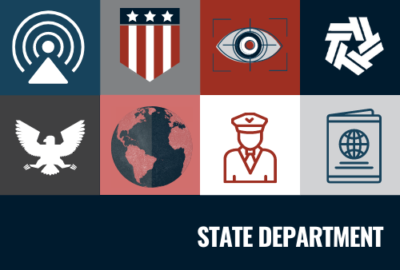Drop in international travel during pandemic jeopardized State Dept passport revenue
The pandemic squashed international travel and that cut the State Department's passport and visa revenues by more than 41%. The fees basically fund the Bureau of...
Best listening experience is on Chrome, Firefox or Safari. Subscribe to Federal Drive’s daily audio interviews on Apple Podcasts or PodcastOne.
The pandemic squashed international travel and that cut the State Department’s passport and visa revenues by more than 41%. The fees basically fund the Bureau of Consular Affairs. Congressional auditors said the bureau has a carryover fund, but that’s also in jeopardy. The Federal Drive with Tom Temin got the details from the Director of International Affairs and Trade issues at the Government Accountability Office, Jason Bair.
Interview transcript:
Tom Temin: And review for us how the bureau is actually funded? Is it totally by the passport and these revenues? Do they get some appropriations also? Or how does it all work to begin with?
Jason Bair: Yeah, it’s a great question. And it’s a little complicated. So let me just give you a little bit of the history. And honestly, for most of the history of the United States, it kind of worked like most other federal programs and activities where Congress did appropriate funds for the State Department to carry out these functions. But then back in 2013, Congress changed the way it worked, and it switched it to a fully fee funded organization. So their revenue does come exclusively from passport applications and visa applications and some other fees that they charge for services that they provide to Americans and others looking to come to the United States. And that held pretty well, frankly, for quite a while, in fact, for most of the history since 2013, you know, they were collecting more in revenue than they were having to expend to provide those services. But then, you know, we all know the pandemic hit, you know, it has a significant impact on travel and has a significant impact on how many people were applying for visas and passports and there was a significant decline in the amount of revenue that they were getting on the order of magnitude of 41%, is what we were seeing. And so Congress did have to step in, during the course of the pandemic and appropriate, a few 100 million dollars to basically make sure that those operations were still solvent. But the goal and the expectation for the long term is that they’re going to be just based purely on the fees that they collect.
Tom Temin: And if this were a business, then it would seem like they have a really high level of fixed costs versus their variable costs. Because if they were a business, they would have cut back to meet the revenues they do have. But that wasn’t possible in this case?
Jason Bair: Yeah you’re right. There are some variable costs, like you know, the cost of the actual passport books and things like that. But that’s relatively minimal. You’re right, they do have quite a bit of fixed costs. And part of that, again, is because since they’re totally fee funded, they have to do things like pay for the space that they use in the U.S. Embassy or a consulate overseas. And that’s not the kind of thing that you can just stop renting and rent out to another tenant. So those costs are going to be pretty consistent over time. And then there’s a decent amount of labor costs in there. Those are kind of U.S. State Department, Foreign Service Officers performing these consular functions. You know, it was a policy decision, we’re not going to suddenly fire all these people and let them go from federal service just because a pandemic came along, because we would, you know, at some point need to bring people back. So yeah, it is a little bit of a challenging environment. And I do appreciate the bind that the State Department is in. It’s hard to project what future revenues are going to be. And they’ve got a limitation on what they can do on the expense side.
Tom Temin: Right. And let’s talk about that carryover fund. What is that the carryover balance? What is it? What purpose does it serve? And what are the trends you’re noticing in the levels of carryover?
Jason Bair: Yeah, so this is something that I think is really important to understand at a fundamental level. And I guess the best way for you and the listeners to understand it is if it was your own personal checking account, you know, you theoretically, should try to have, at a minimum, your expenses and your income evening out. The trouble is twofold for the State Department when it comes to consular fees. One is, their income isn’t constant, it’s not like they get a paycheck every two weeks or every month, it’s going to depend on when people are applying for those visas and passports. And that’s not even across the year. You know, historically, kind of the spring and summer time periods are when they have a lot of those applications. And so that’s when a lot of their revenue is coming in. And so if you started the year with kind of a zero balance, then they would have real problems continuing their operations, because they just wouldn’t have sufficient funds. So they’ve set for themselves a target of about 25% of their expenditures that they would like to have at the beginning of the year, to make sure that they can carry forward into those spring and summer months when the revenue is going to kick in. And I think one of the key things that we found was that because of the decline in revenue, we’re concerned that they’re going to drop below that threshold and continue to decline in their revenue in coming years.
Tom Temin: We’re speaking with Jason Bair, director of international affairs and trade issues at the GAO. So in effect, then that carryover balances like the revolving fund, if they were to go to a bank to cover when revenues are low, but then they pay it back when the revenues exceed their costs?
Jason Bair: Yeah, they don’t so much have to pay it back because it’s a fund that they control for themselves. But yeah, the idea is to give them a little bit of cushion. You know, they are still a federal agency and they still have to worry about the anti-deficiency act and things like that. And so that’s really what it’s there for to make sure that they have have sufficient funds to cover the revenue over the course of the year.
Tom Temin: Now, GAO then ran three scenarios, an optimistic one, a neutral one and a pessimistic one on revenues for the bureau. And what did those show you?
Jason Bair: Yeah, they showed us a couple important things. I mean, one is, overall, it looks like their revenue, all other things being equal, will probably decline in coming years. Without some changes, you know, and that’s an important caveat. Because if they need to make changes, they’re going to have to make those adjustments, whether that’s increasing fees or reducing services or, you know, potentially going back to Congress to ask for more appropriations or more legal flexibilities. But I think the second thing is that it really helped illuminate the fact that they are in a spot where they do just have a structural issue, because one of the things that we figured out pretty quickly when we got into this issue is that there are actually a number of services that they don’t charge any fee for. And that creates a real issue, kind of in trying to make the overall books balance.
Tom Temin: What are some of the things that they potentially could charge for, and I presume they would need congressional approval to charge for them?
Jason Bair: Yeah, so there are the services that they don’t charge for, some of which are dictated by Congress, others of which are policy decisions. So it’s things like, you know, the Special Immigrant Visa, I think a lot of your listeners have probably heard about, you know, people applying for Special Immigrant Visas, there’s not a fee for applying for those visas. Similarly, there’s not a fee for charging for diplomats who are applying for visas to come to the United States. But then it’s other kind of notable things like, at the beginning of the pandemic, we had millions of Americans who were stuck abroad, when the pandemic hit and air travel largely shut down. The State Department then a lot of time and effort to try to get those Americans home, they didn’t charge a fee for those services to try to facilitate that happening. And then, you know, in the other respect, they have a number of services they provide to Americans when they’re abroad. So let’s say you happen to find yourself in prison in a foreign country. If you call the embassy or the consulate, they’re going to help you. And they don’t charge you a fee for coming to help you on that. So there are a variety of things. And again, these are a combination of policy decisions and statutory prohibitions.
Tom Temin: Yeah, a lot of those things feel like yeah, I pay for them every April 15. So there’s some philosophical questions here, not just fiscal ones. And all right, so looking at the fact that the revenues could be down historically, for the foreseeable future, then that carryover fund is going to be less than probably optimal. What are your recommendations for the State Department?
Jason Bair: Yeah, we’ve got a few, some of which are on the more technical side about how they do their estimates and things like that. But I think the real core fundamental recommendation that we make that we hope the State Department heeds, is to come up with a more comprehensive plan for what they need to do to remain fiscally solvent. Because again, as I mentioned a moment ago, there are a whole variety of options for how to deal with a revenue shortfall. I mean, in the normal business context, you could reduce your expenses. In this context, it’s, again, it’s hard to reduce the expenses, but they could not add people to address maybe a backlog that might happen in the future. So that’s a way that they could limit expenses. On the other hand, they do have the authority to change the fees. You know, just at the beginning of this year, actually, we saw the cost of a brand new passport, you know, go up by $20 to $165, they could increase fees, which again, has an impact on Americans who are applying for that. And at the same time, you know, every year that are coming to Congress in their annual congressional budget request, asking for a variety of additional legislative flexibilities. And so where we’re coming from, they need to look at these things comprehensively. And they need to go to Congress since they would be implicated in some of these things, and say, here’s how we want to look at these issues. You know, let’s make sure we’re on the same page about an approach to handle future funding shortfalls.
Copyright © 2025 Federal News Network. All rights reserved. This website is not intended for users located within the European Economic Area.
Tom Temin is host of the Federal Drive and has been providing insight on federal technology and management issues for more than 30 years.
Follow @tteminWFED





